#The Exegesis of Philip K. Dick
Quote
Pain and hope are the two mutually exclusive primary realities that unify and become the ultimate, new synthesis for our age; we must feel both to experience this new synthesis that is serving, simplicity, and sharing; pain without hope is miserable, but hope without pain is empty and futile.
Philip K. Dick, The Exegesis of Philip K. Dick
#pain#hope#feelings#emotions#experience#existence#sacrifice#life#quotes#Philip K. Dick#The Exegesis of Philip K. Dick
123 notes
·
View notes
Text
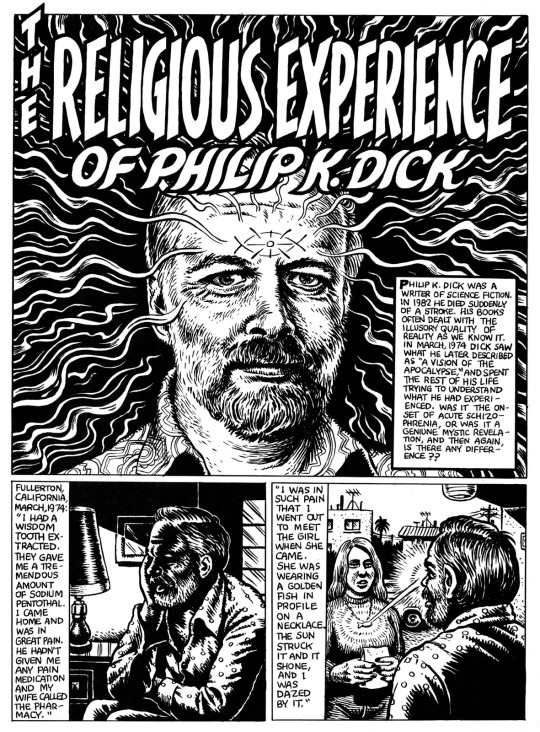
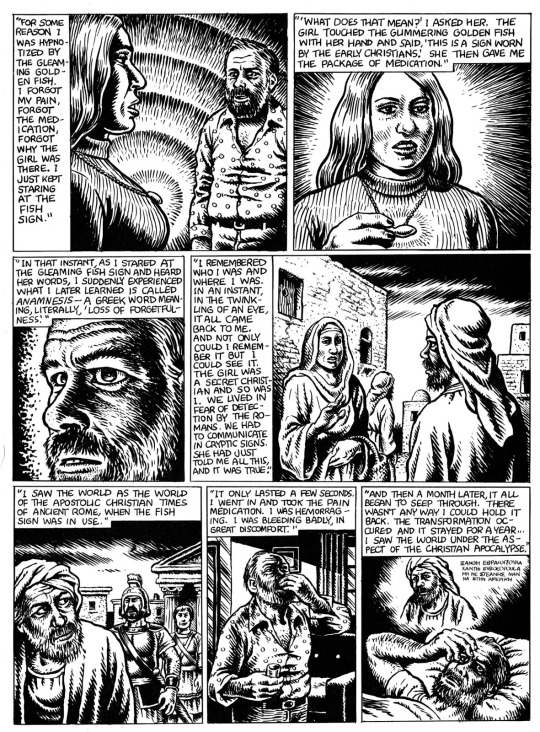
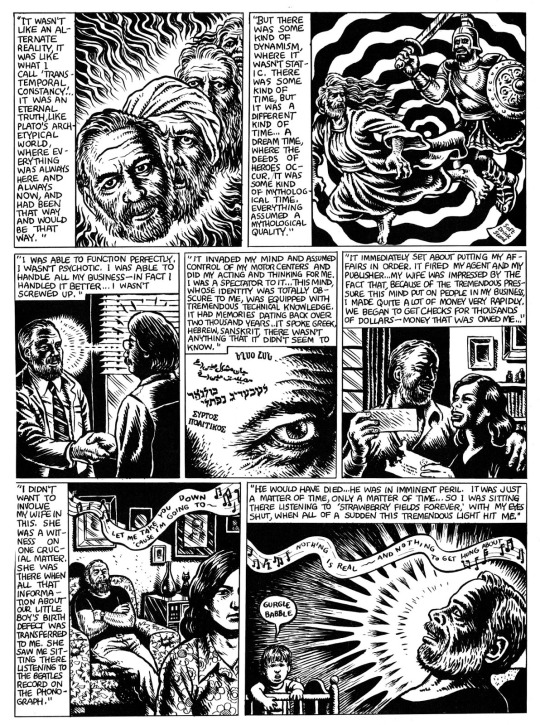
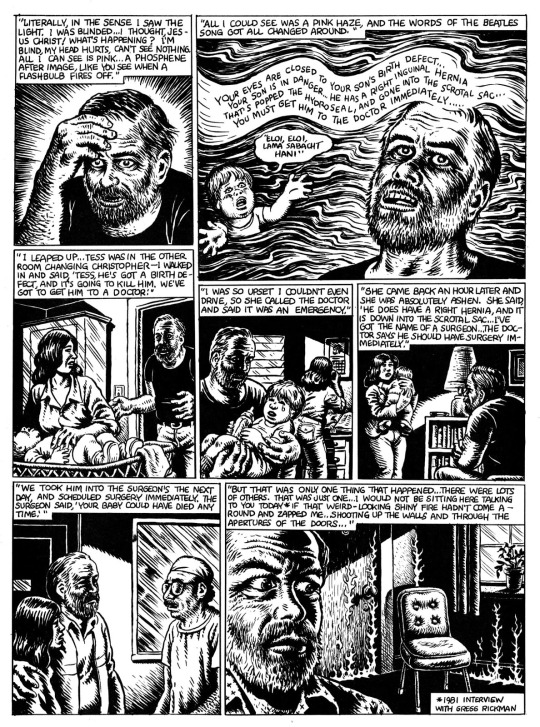
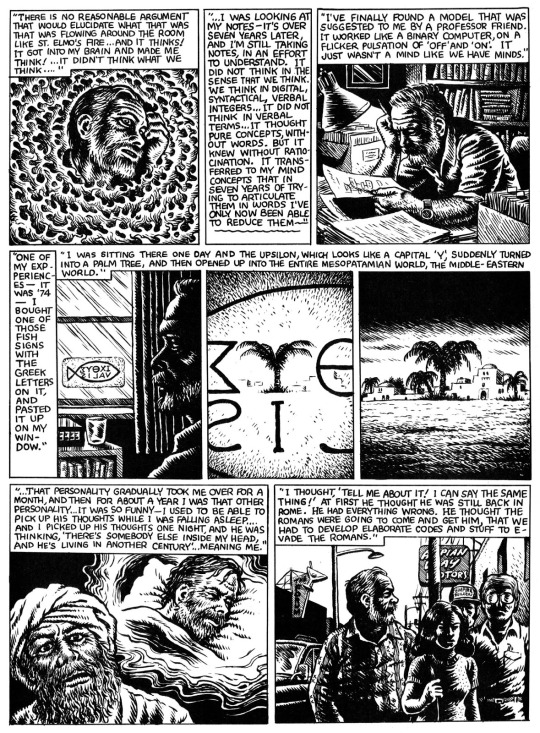
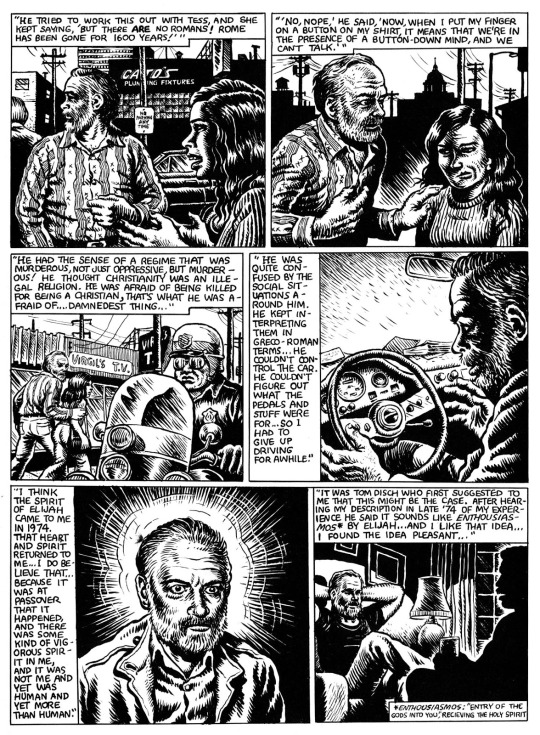
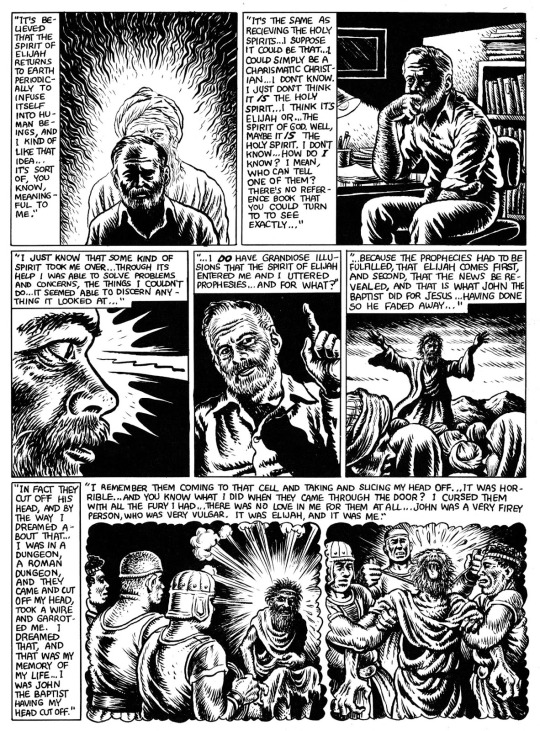
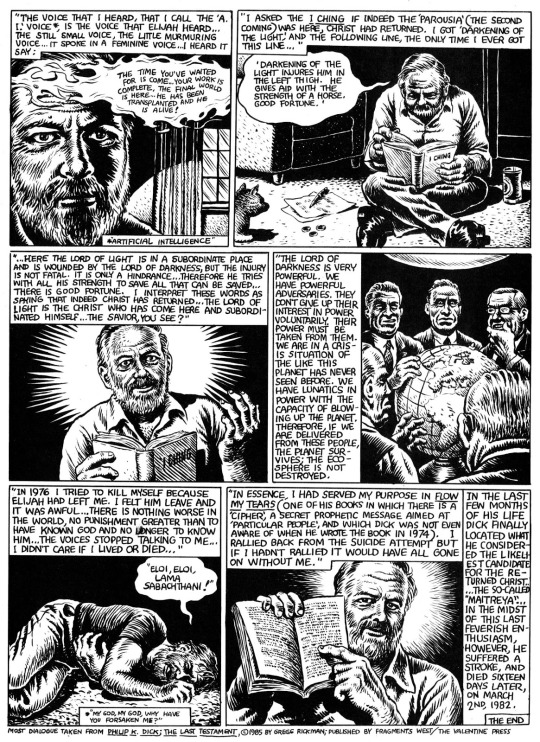

Click on each image to see it in full so you can read it.
“I saw God,” Fat states, and Kevin and I and Sherri state, “No, you just saw something likeGod, exactly like God.” And having spoke, we do not stay to hear the answer, like jesting Pilate, upon his asking, “What is truth?”
– Philip K. Dick, VALIS
In February and March, 1974, Philip K. Dick (December 16, 1928 – March 2, 1982) met God. You can read about the meeting in The Exegesis of Philip K. Dick. What Dick called his “divine madness” and inspiration go hand-in-hand, so the familiar sounding God became VALIS – Vast Active Living Intelligence System, which became a 1981 novel in which the narrator Horselover Fat believes his visions reveal hidden truth about life as we know it.
Looking on was cartoonist Robert Crumb, who introduced us to his God in his Book of Genesis. In issue #17 Weirdo (1986), the magazine Crumb created in 19081, the artist narrated and illustrated Dick’s meeting with the supreme being in The Religious Experience of Philip K. Dick.
The story begins with PKD recovering from a drug-aided wisdom tooth extraction. The pharmaceutical delivery girl arrives at his door. She is wearing a golden fish pendant.
In that instant, as I stared at the gleaming fish sign and heard her words, I suddenly experienced what I later learned is called anamnesis—a Greek word meaning, literally, “loss of forgetfulness.” I remembered who I was and where I was. In an instant, in the twinkling of an eye, it all came back to me. And not only could I remember it but I could see it. The girl was a secret Christian and so was I. We lived in fear of detection by the Romans. We had to communicate with cryptic signs. She had just told me all this, and it was true.
For a short time, as hard as this is to believe or explain, I saw fading into view the black, prisonlike contours of hateful Rome. But, of much more importance, I remembered Jesus, who had just recently been with us, and had gone temporarily away, and would very soon return. My emotion was one of joy. We were secretly preparing to welcome Him back. It would not be long. And the Romans did not know. They thought He was dead, forever dead. That was our great secret, our joyous knowledge. Despite all appearances, Christ was going to return, and our delight and anticipation were boundless.
– The Exegesis of Philip K. Dick
#robert crumb#philip k. dick#god#sci fi#1970s#70s#the religious experience#sci fi authors#science fiction#divine madness#the exegesis of philip k. dick
0 notes
Text

“We hypostatize information into objects. Rearrangement of objects is change in the content of the information; the message has changed. This is a language which we have lost the ability to read. We ourselves are a part of this language; changes in us are changes in the content of the information. We ourselves are information-rich; information enters us, is processed and is then projected outward once more, now in an altered form. We are not aware that we are doing this, that in fact this is all we are doing”
― Philip K. Dick
“We are all sleeping avatars of God, with amnesia.”
― Philip K. Dick, The Exegesis of Philip K. Dick
2 notes
·
View notes
Text
the exegesis of philip k dick is a strong base for my understanding of harry honestly (a strong base for my understanding of self too i got a lot goin on in there)(we're twins, me and harry)(is harry not just horselover fat if he was a cop)(i know the answer to that is no but what if it was YES)
3 notes
·
View notes
Text
so i’m reading up on some historical context for Faust so i know wtf i’m getting myself into when i start reading
and the way everyone talks about Faust part 2, like. am i about to read The Exegesis Of Philip K. Dick, early-1800s-German-edition? i mean, to be clear, i’m the kind of nerd who loved the exegesis, and my German literature background is extremely weak, so this is probably “girl who’s only read philip k dick getting philip k dick vibes”... but damn if everyone talking about pt 2 doesn’t sound exactly Like That TM
3 notes
·
View notes
Text
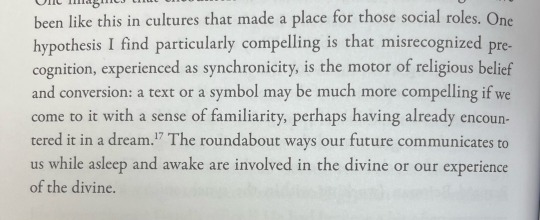
You read and read and read and then finally some passage clicks into place and the puzzle image is revealed. This goes all the way back to Philip K Dick’s Exegesis that I read years ago, only to find the answer in Eric Wargo’s Precognitive Dreamwork and the Long Self (above page 132). It’s more than this particular passage but it sums up the chief aspect.
1 note
·
View note
Video
youtube
The exegesis of Philip K. Dick - hacking the hero's journey: Richard Doyle at TEDx
Professor Doyle is the Liberal Arts Research Professor at Penn State University, where he taught since 1994. Since reading the work of futurist Alvin Toffler at age 12, Doyle has been on a scholarly and personal quest to understand the effects of information technologies on the evolution of human culture. After completing a PhD at UC Berkeley and a post doctoral fellowship at MIT, he has received grants from the National Science Foundation and written a trilogy of scholarly books on the effects of information technologies on human evolution and the effects of language on consciousness. His latest, Darwin's Pharmacy: Sex, Plants & The Evolution of the Noosphere, focuses on the co-evolution of humans with psychedelic plants such as psilocybin, cannabis, and ayahuasca as humans explored the space of all possible states of consciousness with the same fervor as they explored the external world.
1 note
·
View note
Text
The future is more coherent than the present, more animate and purposeful, and on a real sense, wiser. It knows more, and some of this knowledge gets transmitted back to us by what seems to be a purely natural phenomenon. We are being talked to, by a very informed Entity: that of all creation as it lies ahead of us in time.
Philip K. Dick - Exegesis (2011)
43 notes
·
View notes
Quote
Each of us has suffered a primordial inner schism with the result that any given human self is only part of a once-intact greater self. Each of us is alienated from the world (man contra world) because each of us is alienated from himself, not just warring or in conflict: no: the parts of the self have become separated from each other and because of that, experience of world is partial, occluded, impaired, deformed. A partial self experiences a partial world, with the result that world is alien, irreal, hostile, strange, arousing perplexity and dread. Man does not understand world because he does not understand himself...
Philip K. Dick, The Exegesis of Philip K. Dick
#self#other#world#alienation#experience#subjectivity#objectivity#quotes#Philip K. Dick#The Exegesis of Philip K. Dick
98 notes
·
View notes
Text
Been listening to the Exegesis of Philip K Dick.
Wow. I honestly wonder if he went crazy. He thought he was living in a Ubik reality. I can't fault his reasoning. I am like 8 hours into a 59 hour audio. I have had to listen and re listen to those previous eight hours several times.
He approaches this with his own gnostic slant. Not being Christian enough I miss the trinity connection and so on.
But wow
4 notes
·
View notes
Text
Perhaps this is the bottom line to mental illness: incomprehensible events occur; your life becomes a bin for hoax-like fluctuations of what used to be reality. And not only that— as if it weren't enough— but you […] ponder forever over these fluctuations in an effort to order them into a coherency, when in fact the only sense they make is the sense you impose on them, out of the necessity to restore everything into shapes and processes you can recognize. The first thing to depart in mental illness is the familiar. And what takes its place is bad news because not only can you not understand it, you cannot communicate it to other people. The madman experiences something, but what it is or where it comes from he does not know.
Philip K Dick, VALIS (chapter-2)
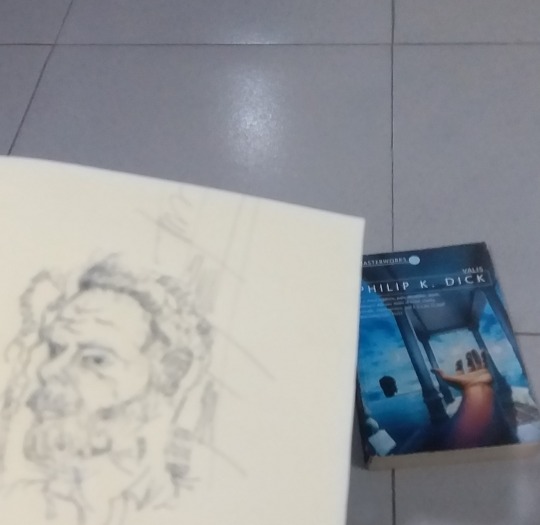
#books#used books#philip k dick#science fiction#postmodernism#mental illness#quotes#quotation#sci fi#exegesis
2 notes
·
View notes
Quote
Ce que nous appelons "musique" est un ensemble de structures ou de motifs mathématiques audibles: des séquences mathématiques complexes et uniques que le compositeur amorce puis complète; le plaisir esthétique est lié aux maths rendues audibles en entendues par le cerveau droit.
“L’exégèse de Philip K. Dick : volume 2″, Philip K. Dick, J’ai Lu, coll. Nouveaux Millénaires, 2017 , p. 649
#Exegesis#Exégèse#L'exégèse de Philip K. Dick#Philip K. Dick#PKD#Maths#Musique#Music#Studyblr#Quote#Citation#Quotation
61 notes
·
View notes
Link
"We are going to have to deal with propositions which are simultaneously both true and false; my corollary is that mutually contrary propositions may be equally true."
—Philip K. Dick, Exegesis
2 notes
·
View notes
Photo
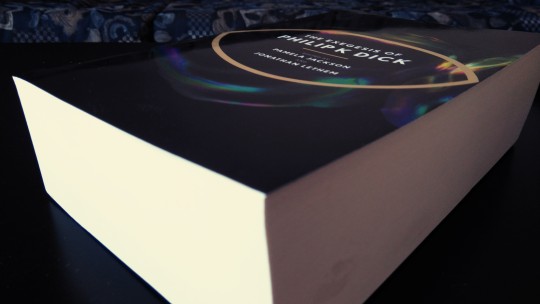
When your professor asks you to buy this leviathan of a book — only to end up never asking you to read any of it.
(I still don’t know if I should be happy or not)
#studyblr#graduate student#literature#science fiction#philip k. dick#books#srsly tho#student#problems#me#the exegesis of philip k. dick#reading#textbooks#mixed feelings
5 notes
·
View notes
Photo
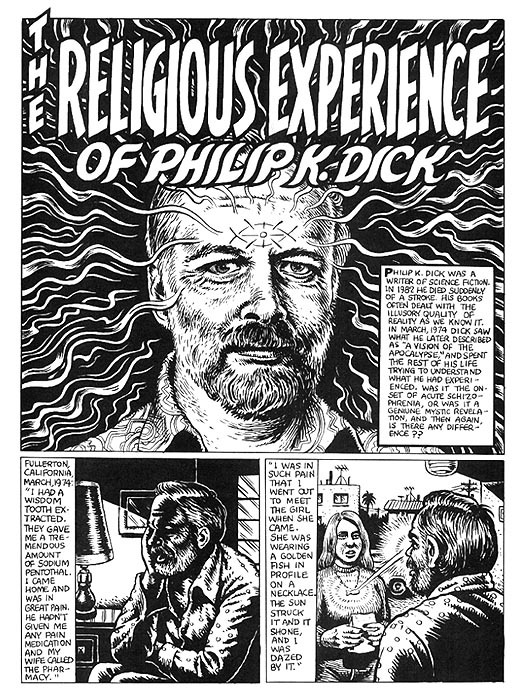
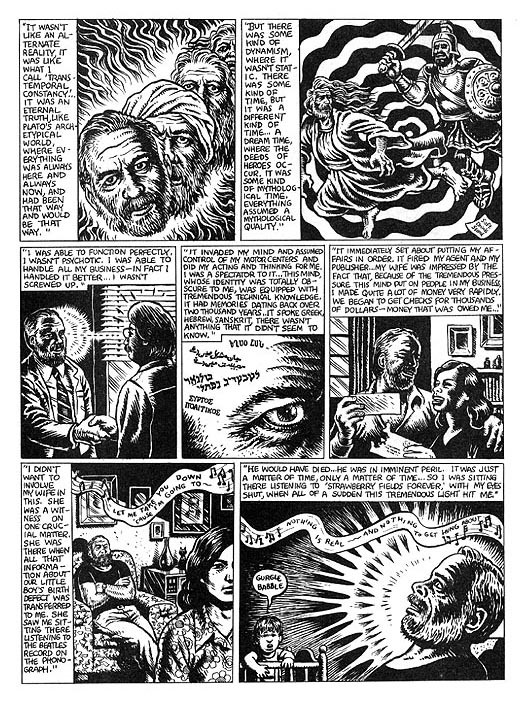
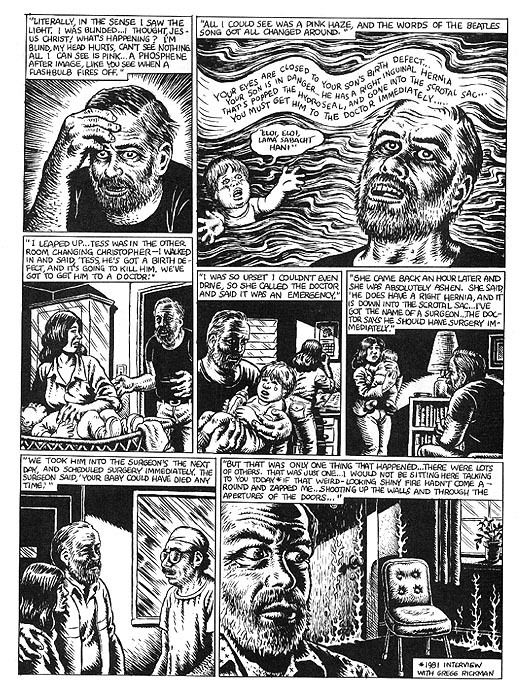
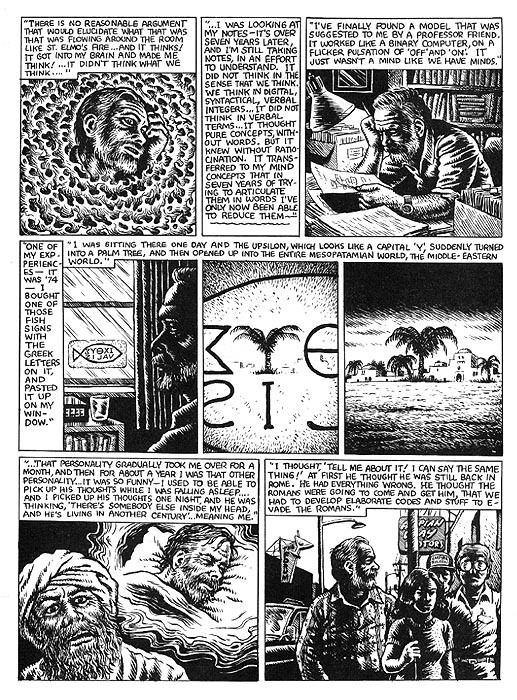
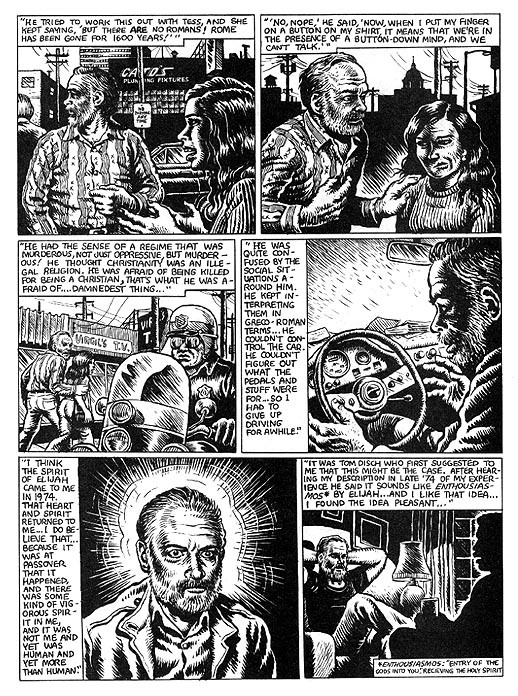
Robert Crumb illustrated Philip K. Dick’s spiritual experience for the underground comic magazine Weirdo. I’ve been sifting shifting settling in to the enormous Exegesis of Philip K. Dick as his cosmic illuminations make looming connections with the Mortuary of Mushrooms and my yet to be delivered Letter To A Spore.
#Philip K. Dick#PKD#illuminations#cosmic#exegesis#jonathan letham#mystical#metaphysical#hallucinatory#simultaneous reality#truth#afterlife#illusion#allusion#reality#divine#robert crumb#weirdo#comics
3 notes
·
View notes
Photo
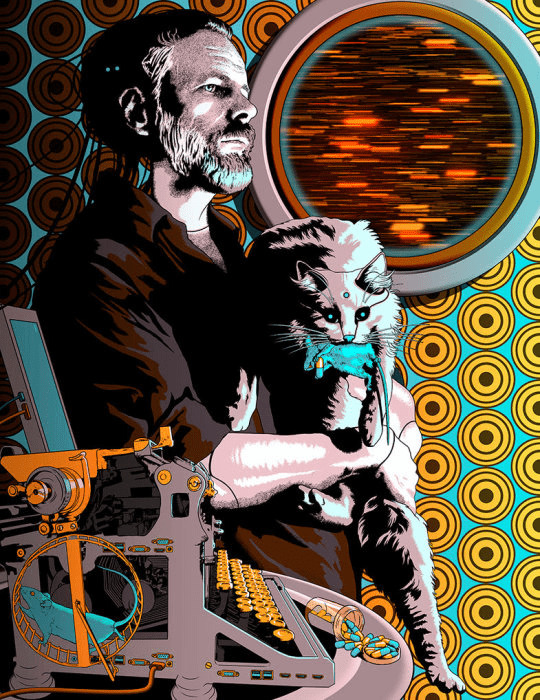
The Ten Major Principles of the Gnostic Revelation found in The Exegesis by Philip K Dick
The Gnostic Christians of the second century believed that only a special revelation of knowledge rather than faith could save a person. The contents of this revelation could not be received empirically or derived a priori. They considered this special gnosis so valuable that it must be kept secret. Here are the ten major principles of the gnostic revelation:
The creator of this world is demented.
The world is not as it appears, in order to hide the evil in it, a delusive veil obscuring it and the deranged deity.
There is another, better realm of God, and all our efforts are to be directed toward
a. returning there
b. bringing it here
Our actual lives stretch thousands of years back, and we can be made to remember our origin in the stars.
Each of us has a divine counterpart unfallen who can reach a hand down to us to awaken us. This other personality is the authentic waking self; the one we have now is asleep and minor. We are in fact asleep, and in the hands of a dangerous magician disguised as a good god, the deranged creator deity. The bleakness, the evil and pain in this world, the fact that it is a deterministic prison controlled by the demented creator causes us willingly to split with the reality principle early in life, and so to speak willingly fall asleep in delusion.
You can pass from the delusional prison world into the peaceful kingdom if the True Good God places you under His grace and allows you to see reality through His eyes.
Christ gave, rather than received, revelation; he taught his followers how to enter the kingdom while still alive, where other mystery religions only bring about amnesis: knowledge of it at the “other time” in “the other realm,” not here. He causes it to come here, and is the living agency to the Sole Good God (i.e. the Logos).
Probably the real, secret Christian church still exists, long underground, with the living Corpus Christi as its head or ruler, the members absorbed into it. Through participation in it they probably have vast, seemingly magical powers.
The division into “two times” (good and evil) and “two realms” (good and evil) will abruptly end with victory for the good time here, as the presently invisible kingdom separates and becomes visible. We cannot know the date.
During this time period we are on the sifting bridge being judged according to which power we give allegiance to, the deranged creator demiurge of this world or the One Good God and his kingdom, whom we know through Christ.
To know these ten principles of Gnostic Christianity is to court disaster.
40 notes
·
View notes